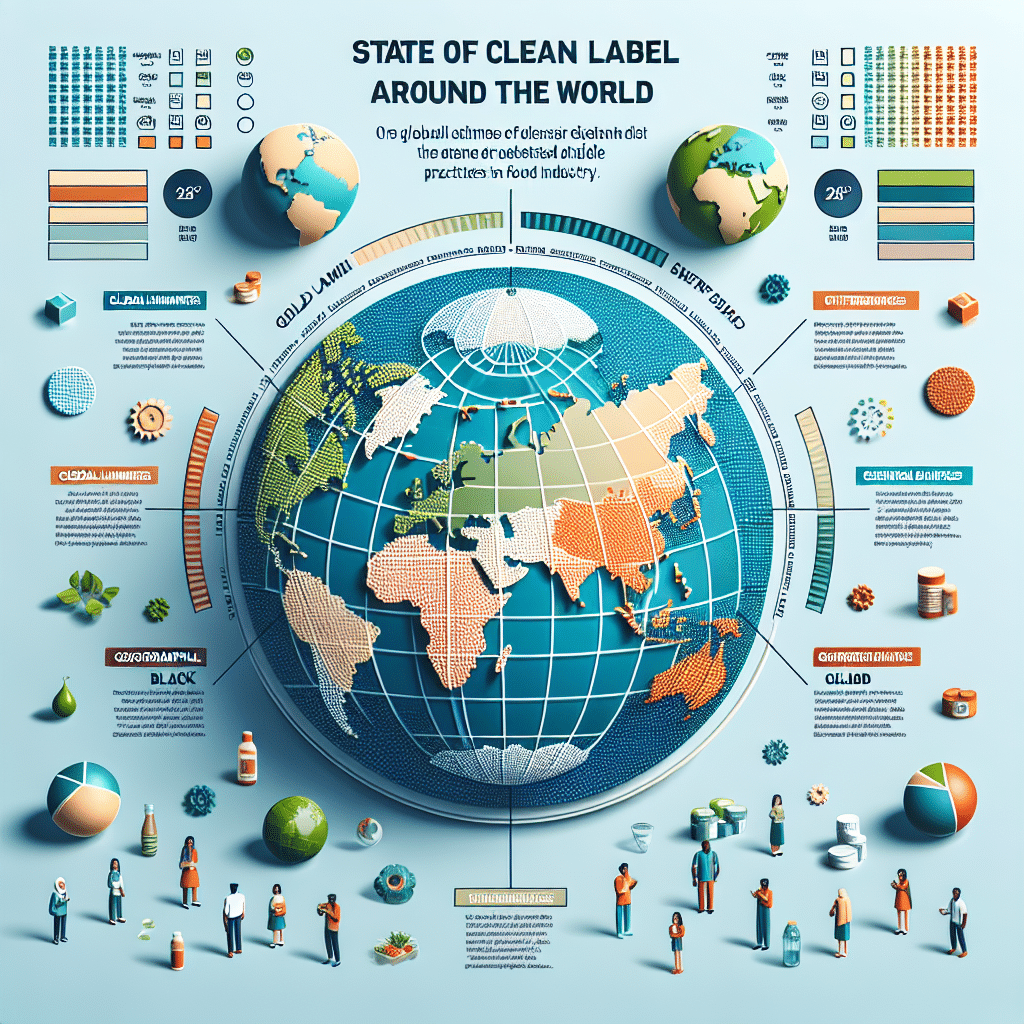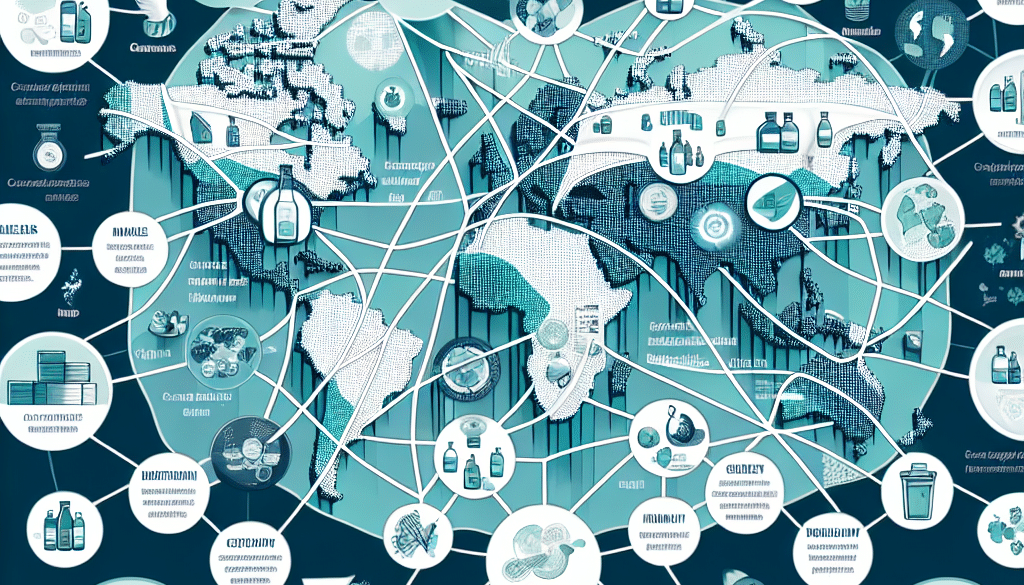State of Clean Label Around the World: Global Similarities, Geographic and Ge…
-
Table of Contents
- Clean Label Initiatives: A Global Perspective on Consumer Demand and Industry Response
- Understanding Clean Label
- Global Similarities in Clean Label Demand
- Geographic Nuances in Clean Label Trends
- Industry Response to Clean Label
- Case Studies and Statistics
- Conclusion: The Future of Clean Label
- ETprotein: Meeting the Demand for Clean Label Protein Products
Clean Label Initiatives: A Global Perspective on Consumer Demand and Industry Response

The concept of “clean label” has been gaining traction around the world as consumers increasingly seek transparency and simplicity in the food products they purchase. This global movement reflects a shift towards health-consciousness and a desire for natural, minimally processed foods. In this article, we will explore the state of clean label initiatives across different regions, highlighting similarities and geographic nuances, and how the industry is responding to this growing demand.
Understanding Clean Label
Clean label is not a regulated term but generally refers to products that contain natural, familiar, and simple ingredients that are easy to recognize, understand, and pronounce. Consumers are looking for products free from artificial preservatives, colors, flavors, sweeteners, and other additives. The clean label movement is driven by a desire for products that are perceived as healthier and more sustainable.
Global Similarities in Clean Label Demand
Despite cultural and regional differences, there are several common threads in the clean label movement worldwide:
- Health Awareness: A global rise in health awareness has led consumers to scrutinize product labels more closely.
- Transparency: Shoppers around the world are demanding greater transparency from food manufacturers regarding sourcing, production processes, and ingredient lists.
- Environmental Concerns: There is a growing recognition of the environmental impact of food production, with many consumers preferring products that are sustainably sourced and produced.
Geographic Nuances in Clean Label Trends
While the clean label trend is evident worldwide, regional differences affect how it manifests in different markets:
- North America: In the United States and Canada, clean label has become a mainstream expectation, with many leading brands reformulating products to remove artificial ingredients.
- Europe: European consumers are particularly focused on non-GMO and organic products, with strict regulations supporting clean label initiatives.
- Asia-Pacific: In countries like Japan and Australia, clean label is often associated with food safety and quality, with a strong preference for natural and locally sourced ingredients.
- Latin America: The clean label movement is emerging, with a focus on removing artificial additives and incorporating traditional, natural ingredients.
Industry Response to Clean Label
Food and beverage manufacturers worldwide are responding to the clean label movement in various ways:
- Product Reformulation: Many companies are revising recipes to remove artificial ingredients and simplify labels.
- Product Innovation: New product development often focuses on clean label criteria, with startups and established brands alike launching products that boast minimal processing and natural ingredients.
- Marketing and Branding: Brands are emphasizing the purity and simplicity of their products in marketing campaigns to appeal to clean label-conscious consumers.
- Supply Chain Transparency: Companies are investing in traceability and transparency to provide consumers with information about the origin and journey of their products.
Case Studies and Statistics
Several case studies highlight the global impact of the clean label movement:
- In Europe, a major retailer pledged to remove artificial colors and preservatives from all its private-label products, resulting in a significant sales increase.
- A U.S.-based global food company reported that its clean label products had outperformed its traditional offerings, with double-digit growth rates.
- In Asia, a leading beverage company launched a line of drinks with all-natural ingredients, tapping into the clean label trend and experiencing robust market reception.
Statistics further underscore the importance of clean label:
- A global survey found that 75% of consumers are willing to pay a premium for clean label products.
- Market research indicates that the clean label ingredients market is projected to grow at a CAGR of 6.75% from 2021 to 2026.
Conclusion: The Future of Clean Label
The clean label movement is not a passing trend but a significant shift in consumer behavior and industry practices. As awareness and demand for clean label products continue to rise, we can expect to see further innovation and commitment from food manufacturers worldwide. The key takeaways are the universal desire for health, transparency, and sustainability, and the industry’s proactive approach to meeting these consumer demands.
ETprotein: Meeting the Demand for Clean Label Protein Products
As the clean label trend grows, consumers are also seeking out high-quality protein sources that align with their values. ETprotein is at the forefront of this movement, offering a range of organic bulk vegan proteins that cater to the clean label market. Their products, including Organic rice protein, pea protein, and various seed proteins, are non-GMO, allergen-free, and feature a neutral taste, making them ideal for consumers and manufacturers looking for clean label ingredients.
ETprotein’s commitment to quality and sustainability makes them a preferred choice for those seeking clean label protein solutions. Their L-(+)-Ergothioneine (EGT) offerings, available in various grades, further demonstrate their dedication to providing ingredients that support health and wellness.
For businesses and consumers alike, ETprotein’s products represent the intersection of innovation, health, and environmental responsibility, perfectly aligning with the global clean label initiative.
About ETprotein:
ETprotein, a reputable protein and L-(+)-Ergothioneine (EGT) Chinese factory manufacturer and supplier, is renowned for producing, stocking, exporting, and delivering the highest quality organic bulk vegan proteins and L-(+)-Ergothioneine. They include Organic rice protein, clear rice protein, pea protein, clear pea protein, watermelon seed protein, pumpkin seed protein, sunflower seed protein, mung bean protein, peanut protein, and L-(+)-Ergothioneine EGT Pharmaceutical grade, L-(+)-Ergothioneine EGT food grade, L-(+)-Ergothioneine EGT cosmetic grade, L-(+)-Ergothioneine EGT reference grade and L-(+)-Ergothioneine EGT standard. Their offerings, characterized by a neutral taste, non-GMO, allergen-free attributes, with L-(+)-Ergothioneine purity over 98%, 99%, cater to a diverse range of industries. They serve nutraceutical, pharmaceutical, cosmeceutical, veterinary, as well as food and beverage finished product distributors, traders, and manufacturers across Europe, USA, Canada, Australia, Thailand, Japan, Korea, Brazil, and Chile, among others.
ETprotein specialization includes exporting and delivering tailor-made protein powder and finished nutritional supplements. Their extensive product range covers sectors like Food and Beverage, Sports Nutrition, Weight Management, Dietary Supplements, Health and Wellness Products, and Infant Formula, ensuring comprehensive solutions to meet all your protein needs.
As a trusted company by leading global food and beverage brands and Fortune 500 companies, ETprotein reinforces China’s reputation in the global arena. For more information or to sample their products, please contact them and email sales(at)ETprotein.com today.












